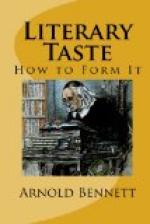The makers of literature are those who have seen and felt the miraculous interestingness of the universe. And the greatest makers of literature are those whose vision has been the widest, and whose feeling has been the most intense. Your own fragment of insight was accidental, and perhaps temporary. Their lives are one long ecstasy of denying that the world is a dull place. Is it nothing to you to learn to understand that the world is not a dull place? Is it nothing to you to be led out of the tunnel on to the hillside, to have all your senses quickened, to be invigorated by the true savour of life, to feel your heart beating under that correct necktie of yours? These makers of literature render you their equals.
The aim of literary study is not to amuse the hours of leisure; it is to awake oneself, it is to be alive, to intensify one’s capacity for pleasure, for sympathy, and for comprehension. It is not to affect one hour, but twenty-four hours. It is to change utterly one’s relations with the world. An understanding appreciation of literature means an understanding appreciation of the world, and it means nothing else. Not isolated and unconnected parts of life, but all of life, brought together and correlated in a synthetic map! The spirit of literature is unifying; it joins the candle and the star, and by the magic of an image shows that the beauty of the greater is in the less. And, not content with the disclosure of beauty and the bringing together of all things whatever within its focus, it enforces a moral wisdom by the tracing everywhere of cause and effect. It consoles doubly—by the revelation of unsuspected loveliness, and by the proof that our lot is the common lot. It is the supreme cry of the discoverer, offering sympathy and asking for it in a single gesture. In attending a University Extension Lecture on the sources of Shakespeare’s plots, or in studying the researches of George Saintsbury into the origins of English prosody, or in weighing the evidence for and against the assertion that Rousseau was a scoundrel, one is apt to forget what literature really is and is for. It is well to remind ourselves that literature is first and last a means of life, and that the enterprise of forming one’s literary taste is an enterprise of learning how best to use this means of life. People who don’t want to live, people who would sooner hibernate than feel intensely, will be wise to eschew literature. They had better, to quote from the finest passage in a fine poem, “sit around and eat blackberries.” The sight of a “common bush afire with God” might upset their nerves.
CHAPTER II
YOUR PARTICULAR CASE




